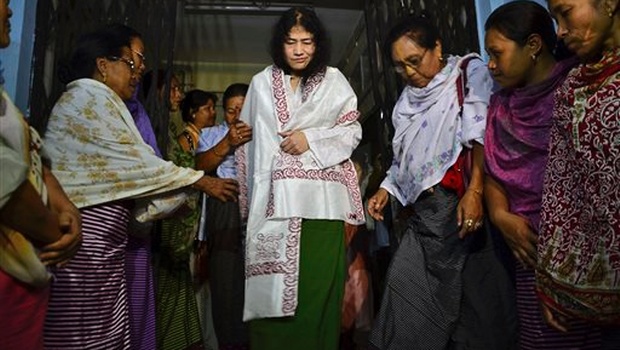The world’s longest hunger strike against an unjust, draconian and often misused law, has ended in abject failure. The Indian human rights activist Irom Sharmila’s 16 year fast against the Indian Armed Forces Special Power Act (AFSPA), ended on Tuesday but AFSPA is still on the statute book with no sign whatsoever of being repealed or even amended with India, the South Asian region, and the world facing terrorism of all kinds.
Seeing the writing on the wall , Sharmila called off the fast ( during which she had been force fed and kept alive in a hospital) and decided to continue the struggle for “self-determination” democratically by fighting the next year’s elections to the Manipur State Assembly and becoming the Chief Minister.
Who is Irom Sharmila?
Often called the ‘Iron Lady of Manipur’, Irom Chanu Sharmila is a civil rights and political activist known for the hunger strike she began in the year 2000 against the misuse of AFSPA by the military forces. Born in 1972, she is the youngest of nine siblings who grew up in Manipur. She gave up her dreams of becoming a doctor and decided to fight against the human rights violation in Manipur. Irom Sharmila has the distinction of being the world’s longest hunger striker, keeping steadfastly to her cause.
What is AFSPA?
Parliament passed the Armed Forces Special Power Act (AFSPA) in 1958, giving special powers to the Indian Armed Forces in seven sister states in the North east which they considered as “disturbed areas”. The According to this Act, the armed forces have the power to search anyone’s property and arrest people without any warrant.
Why was Irom Sharmila on years-long hunger strike?
On November 2000, the Assam Rifles military forces shot and killed 10 innocent civilians at a bus stop in a small town called Malom. Among them was a 1988 National Child Bravery Award winner, and this incident known as the Malom massacre triggered Irom Sharmila to go on a hunger strike against AFSPA.
What is her demand?
Irom Sharmila demanded that the Indian government repeal the Armed Forces Special Powers Act (AFSPA) that gave the army extra powers in Manipur. She was arrested and later charged her for attempting suicide. When her health deteriorated, she was force fed through a nasal tube order to keep her alive even while she was in prison. The government couldn’t break her spirit despite arresting, releasing and re-arresting every year on the charge of attempt to suicide. In 2006, she along with other activists conducted a hunger strike at Jantar Mantar in Delhi but was again arrested.
Did her hunger strike have any effect on the law?
Irom Sharmila’s hunger strike got international attention and members of the European parliament too wrote to the Indian government seeking modification of the Act. Two parties came to her support in 2014 and requested that she contest in the Lok Sabha elections. But the government having kept her in prison, she was denied the right to vote since she was in prison.
What is the present scenario?
Even after writing to the former Prime Minister Manmohan Singh and then to his successor Narendra Modi, the repeal of AFSPA is still a distant dream. In 2016, Irom Sharmila was released from judicial custody but decided to keep her vow of not going to her house or meeting her mother until the government repeals AFSPA.
END



























































